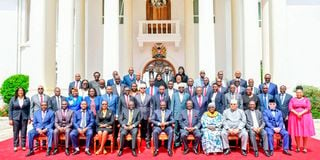Premium
Court declines to set aside order barring Ruto CASs from assuming office

President William Ruto, Deputy President Rigathi Gachagua and Prime Cabinet Minister Musalia Mudavadi take a group photo with the newly sworn-in Chief Administrative Secretaries at State House, Nairobi on March 23, 2023.
The 50 Chief Administrative Secretaries appointed by President William Ruto will continue staying away from office pending the court ruling on whether to lift interim orders that blocked them from assuming office, even though some of them have reported to work.
This is after Justice Hedwig Ong’udi declined requests by the CASs to set aside the temporary orders issued last week from twin petitions filed by the Law Society of Kenya and activists.
The petitions are challenging President Ruto’s powers to appoint 50 CASs instead of 23 as recommended by the Public Service Commission.
At least seven CASs reported to their offices on Monday and were allocated duties. They include Mr Samuel ole Tunai, Ms Millicent Omanga and Ambassador Mohamud Saleh. They were appointed to the Ministry of Interior & National Administration and welcomed on Monday by Cabinet Secretary Prof Kithure Kindiki.
He also allocated them different responsibilities at the power docket subject to the outcome of the ongoing judicial processes.
Others who reported to their workstations include Ms Ann Wanjiku Mwangi, Mr Edwin Sudi Wandabusi and Mr Nicholas Ngabiya Rioba who were appointed to the Office of the Deputy President.
Former Kisii deputy governor Joash Maangi, who was appointed to the Ministry of Foreign Affairs, also reported to his new office.
CASs Dennis Itumbi, Evans Kidero, Samuel Tunai and Nicholas Gumbo on Tuesday pleaded with the court to lift the temporary orders and allow them to return to the offices, which they had held for one day.
Through lawyers Adrian Kamotho, Peter Wanyama and Jotham Arwa, they said the interim conservatory orders should be lifted because they are giving the petitioners an uneven and unfair field on the dispute.
“The conservatory orders have given the petitioners uneven and unfair advantage in the field in a matter that involves total misapprehension and misunderstanding of the provisions regarding powers of the President. Since the CASs hold office, the issue of conservatory orders should be determined at the earliest possible opportunity,” said Mr Wanyama.
“The petitioners are going to this battle with undue advantage,” he stated. He was representing Nicholas Gumbo and Evans Kidero.
Irregular orders
Lawyer Kamotho, for Mr Itumbi, said the petitioners "misled the court to obtain irregular orders".
He said the petitioners failed to disclose that the process leading to the appointments is anchored by Gazette Notice, which has never been suspended nor invalidated by any court. He said the gazette notice remains sound, valid and effective.
Critical matters
"The petitioners deceptively failed to disclose pertinent and germane material to the court. Consequently, the Petitioners knowingly misled the court to issue an injunctive order that would never have been issued, had the Petitioners not irregularly withheld critical matters from the court," said lawyer Kamotho.
They told the court that the orders were issued irregularly and were intended to "subvert the operations of the Government".
Mr Kamotho added that there is no known law that caps the number of Chief Administrative Secretaries at 23.
"The number of office holders to recommend is purely within the province of the PSC based on a comprehensive workload analysis among other relevant considerations. The court cannot be invited to render drastic reliefs as sought here on the basis of legally non-binding proposals borne in the correspondence by Mr Joseph Kinyua, former head of public service," said lawyer Kamotho.
He added that the petitioners "fraudulently misled the court to issue irregular orders, by cunningly stating that the appointments contravened an unauthenticated letter addressed to the Chairperson of the Public Service Commission by Mr Joseph Kinyua, a former head of public service requesting for a vacancy declaration of 23 vacancies.”
The CASs backed the Attorney-General, Public Service Commission and the Salaries and Remuneration Commission in pushing for the striking out of the petitions for being filed in the wrong forum –the High Court (Constitutional and Human Rights division) instead of the Employment and Labour Relations Court.
The legal dispute stemmed from twin petitions filed by rights activist Eliud Matindi, the Law Society of Kenya and Katiba Institute.
Among the issues that cropped up in court is the authority of the High Court (Constitutional and Human Rights division) to hear and determine the lawsuits, empanelment of the bench and consolidation of the two petitions.
Another issue that arose involves is whether the court will allow LSK and Katiba Institute to amend their petition.
Substantial issues
Mr Matindi urged the court to consolidate the two files and refer them to the Chief Justice for appointment of a three-judge bench on grounds that the case raises substantial issues of law. He did not identify the said issues.
Attorney-General Justin Muturi asked the court to first handle the issue of jurisdiction before engaging on the merits of the petitions.
Together with PSC and the SRC, the AG want the court to first determine the question of jurisdiction before any other application is dealt with.
Katiba Institute and LSK through lawyer Dudley Ochiel sought permission to amend their suit, a move that was opposed by the four CASs.
“We wish to amend the petition to indicate that the 50 CASs violated Article 3 of the Constitution by failure to reject their appointments to an unconstitutional office,” said Mr Ochiel.
The case will be mentioned on Friday for directions before Justice Hedwig Ong’udi.




